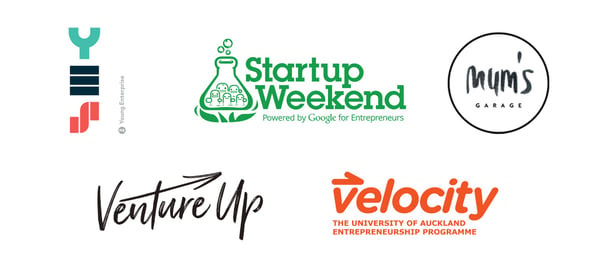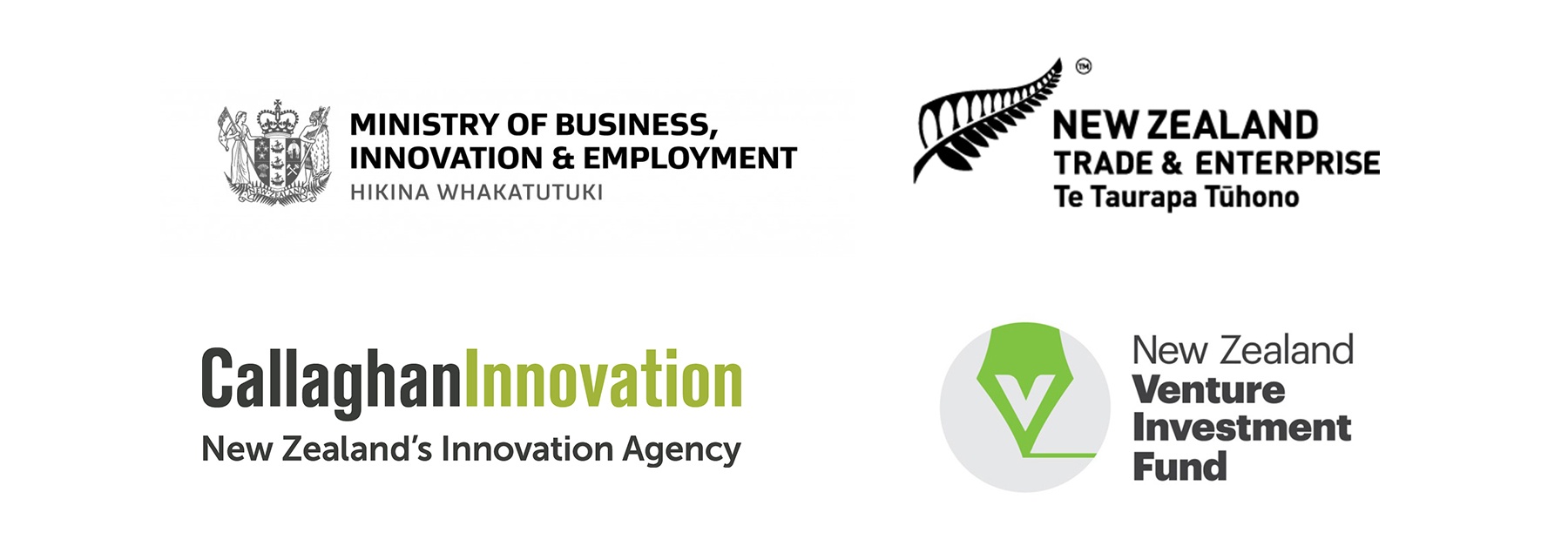I am Andy Hamilton and for over 20 years I have been a student of business, a student of change and I ask a lot of questions. Here’s my profile on LinkedIn - sorry if you get spammed through my stranger-connections (should say no more!). This series is my own views and not The Icehouse tone. I care about getting content out, sharing and engaging with people to make our country better.

In part one of the series I talked about some of the key segments in the work we do at The Icehouse and what is holding their progress back, in part two I shared some questions we often hear more broadly from people in the market and in this third part, I want to share some views on how to build a more sustainable, fair and impactful ecosystem for start-ups & SMEs in New Zealand.
Why do I ask this question about sustainability of the system? Well because it has been a debate at The Icehouse for over 17 years and something that I continually throw around in my head. We bounce from doing good by enabling impact through jobs and wealth creation with doing well for ourselves as an organisation and not having to rely on Government or benevolent funding to support doing good with customers and wider New Zealand. I also think about organisations like Auckland City Mission or the Salvation Army who do great work, and while they don’t think about how to make money from their stakeholder users, they are focused on doing good for people. Every time we take money from Government or the giving community are we taking money away from these people who need the most help to find their path to their own sustainability? Against that, I think about the 1,000+ jobs created each year by our customers and the impact that goodness is having on NZ and the multiplied return the Government is getting from its investment in The Icehouse.
We think about the goal with the start-up and SME market is to enable people who truly make a difference to the businesses, share in the success and outcomes to fund itself on an ongoing basis. Wouldn’t that be the true reflection of making a difference that the customers would be prepared to pay for? That is a novel concept and something I continue to strive for – some might say that after 17 years it might be time to give up, but others would say that it is a time for change in approach to achieve self-sustainability and we could only be here now as a result of what we have done and learned.
Reflections on the question of sustainability in New Zealand generally
It would be fair to say that there appears to be no issue with sustainability in some parts of our economy. Banks make super normal sustainable returns, so do service providers like telco, law and accounting firms, technology companies, and rest home operators. There are also a bunch of international firms like EBOSS, F&P Healthcare, Mainfreight, Vista that are profitable, growing and providing returns to shareholders and investors. These firms are showing you can be sustainable in and from New Zealand.
What about the stock exchange operator, NZX? At its market cap of $80b, it is around 1/3 of our GDP. Other country’s exchanges which have ratios of closer to 1:1 making the market about $160b short in comparison. Why, and what impact does this have on the whole ecosystem of banks, brokers and professional service firms around NZX? Surely this must reduce margins/profit for the rest of NZ? Depending on who you to talk to – we have a great opportunity with our listed market, while it is not meeting the need or potential, and it is at risk of being side-lined by markets and changes like blockchain that will see them being potentially irrelevant. NZX needs new thinking, they need to be open and they need to do things differently. Otherwise NZX is on the crawl to oblivion. Arguably it has already started.
What about the startup and SME market and the ecosystem of incubators, accelerators, seed funds, economic development agencies, other groups including the Government’s agencies themselves – MBIE, Callaghan Innovation, NZTE and the of EDAs in the regions?The non-Government ecosystem is significantly influenced by Government and by the corporate support of these organisations. This is on the basis that they are doing good for people and businesses that need or want or could do with help. In the case of The Icehouse – the corporate support from our partners led by BNZ and in association with the University of Auckland Business School has amounted to well over $7m of funding over 17 years and continues at over $400,000 per annum. There is a whole ecosystem that exists, both providing grass roots support, to advice and mentoring, to funding and connections for people with ideas to existing start-ups to established SMEs.
I think we are starting to see maturity in this system and variety of offerings which we should be recognising as offering differing roles and consideration when looking at funding to support their initiatives.
Groups working with start-ups & SMEs
I see there are two types, those who are grass roots, capability focused and the second who are returns focused – I am going to explain what I mean by this as they are labels and most people might not have thought about them in this way:
Grass Roots
Organisations and people who are helping start-ups and SMEs with capability building to help them find an idea, advance their idea or grow their SME business as a means of making a difference to their community, region and economy.

This could include initiatives to raise aspirations, influence thinking and actions into the future The grass roots movement - think Young Enterprise in Schools, Startup Weekends, Venture Up at Creative HQ, Velocity at the University of Auckland, Mums Garage and other like-focused groups.
These groups are performing a really important role in supporting and guiding. They provide a place for people to go and get inspired, get confidence and, with comfort, test out their ideas, test out their thoughts of starting and growing a business. They are an important utility in our society while they are delivering their objectives.
Build skills, get exposure and help people advance- in some cases this will turn into a business, in most it will not. Participants will however come away with exposure, skills and networks that can be applied in other ways and society will arguably benefit. Think about this as part of our education and lifelong learning system.
At the same time and despite the good that they do for our communities, these grass roots organisations have a very challenging business model as charging for the service they offer is really difficult given most of the participants don’t have the ability to pay. Further, the massive failure rate makes it doubly hard. Societal good, but not profitable from a returns perspective.
This is an operating cost model and a justification for funding support is the capability development the people are getting from the support which will ultimately benefit society – it is a modern-day school of the future for people to develop these skills of how to take ideas and turn them into something society will value. It is our insurance policy of development of the future.
I would like to see more support for these groups given the shortage of high quality founders we have in the market. These organisations need long-term funding that is based on delivering impact, if they fail to deliver, then stop the funding, otherwise keep supporting them, but we need to find a way to fund these groups like we fund our Schools and Colleges. I would like to see a significant shift in the way that Government looks at this sector as it is not recognised the way it should be. This should be part of the education budget, not separate.
Returns Focused
Organisations and people who are helping start-ups and SMEs who believe they can deliver an economic return from this service that is being shared with the firms in the upside created over time.
Initiatives that purport to create significant economic returns from supporting start-ups – (tech incubators, accelerators, seed funds, venture funds) believe that their activities can create a sustainable business long-term from the economic interests that they have in their customers. This is very much a returns focused activity and depending on where they sit on the spectrum is easier than not.

For example, if one of these organisations can raise greater than $60m in funds under management, they should have sufficient scale to be commercial given that the management fees will cover their operating costs and the funds invested (if returned to investors at a benchmark level) will enable them to raise another fund to continue investing over a period of 10+ years. If they can’t deliver the returns, they don’t get more funding to manage.
However, at the earlier stage i.e. seed and startup, the dynamics of the New Zealand market make it very challenging to build a sustainable business. There is a high failure rate in the start-up sector, it’s hard to win and even more so, there is a minute big-win percentage. If you want to positively improve this success rate of this group the cost of the input from the organisation will be relatively high i.e. if you have b-or-c class people helping the start-ups, there will be no change in failure rates. If you have a-class people, you might significantly improve the success rate, but how do you fund this over time given we don’t have a significant and successful returns profile in New Zealand from investing in start-ups? Do you see a wall of money coming into the start-up sector because people are making so much from it?
Should anyone fund these activities of grass roots and returns focused or do we just leave it to the market?
It is my view that each of grass roots and returns focused initiatives perform important roles in our economy, particularly when we have such poor metrics like product market fit rates for start-ups and static growth from most SMEs. They are however, very different when it comes to how you judge success and how you might fund each given my view that the economics do not suggest the market will fund them based on returns, because the returns are not there.
The grass roots organisations need long-term (i.e. 5-year or even longer) funding with clear and appropriate KPIs that are focused on making impact through lifting aspirations and capabilities. I would also argue that true market and community focused organisations will always be better at this than Government.
The returns focused organisations similarly may need long-term funding with a set of KPIs are focused on delivering sustainability and independence over time.
In New Zealand, the ecosystem is not scaled enough, and the returns are not there to enable a significant number of these organisations to be successful in their long-term sustainability. I believe these organisation’s business models should have a return sharing that comes from the long-term success of their customers, not from short-term revenue returns such as services to the start-ups. To charge a start-up a fee for service just creates potential for misalignment and also takes valuable resources away from focusing on building their product to fit into the market.
I want to dive into even more geek talk about how these returns focused organisations can be successful given the structure of the New Zealand market, particularly given our scale challenges.
In this, I want to share a question around the extent Kiwi organisations should choose between being horizontally or vertically integrated in their activities. I am talking about the basis of horizontal or vertical operations in their value chain. This can be seen in the context of scale economics in any business. Let me explain as we think about this a lot – when you go into business, you generally want to find a way to reach scale, that enables you to buy well, add value, receive returns and grow your business and success. When you don’t have scale, it sucks. So how can we apply this thinking to the returns focused ecosystem in New Zealand?
A horizontal player is like an Agri-Tech Accelerator, a Technical Transfer Office at a University or Tech College, a Hardware Incubator or a Biotech Seed Investor – that is all they do – take companies in, invest, support, mentor and send them on their way – they focus on building scale economics that gets them high quality sources into the system, they hopefully add a lot of value and then they sell or pass them on to the next player in the ecosystem for a significantly higher value. At some point they liquidate their interests for a large return to enable them to profit, create a return and fund the next group of start-ups coming through their system.
It is my contention that most likely no horizontal player in New Zealand will be able to become sustainable in their own right. The exceptions would be possibly in industries where we have major competitive advantage and scale and possibly one-off examples that have emerged over time. One such example might be UniServices due to its success and most importantly because it has achieved scale status. A player in the agriculture industry could be another example and that is much needed in New Zealand.
All other organisations are going to require significant ongoing funding for at least 10 years to give them a chance to get a return from their investment. Most will fail.
A vertical player provides the counter argument, for organisations to think about how they can become vertically integrated to increase the likelihood of sustainability and returns over time. There is an argument that if these organisations are vertically integrated that take start-ups through more than one phase of their journey and have business models that align to shared success, there is a higher likelihood of scale and ultimately achieving sustainable success from returns.
I am conflicted, because that is what we are doing with The Icehouse in the start-up market – we have simplified our model significantly in working with start-ups, to being an investor led, network model for backing seed and start-up stage companies. We believe over the next 10 years we have both the chance to achieve scale and sustainability by first focusing on investing in start-ups at seed and start-up stage, but then providing capital to the best performing over multiple rounds in the following years of their journey. It is our belief that it is the high failure rate, the lack of capital markets and the uniqueness of New Zealand means that to achieve both doing good and doing well, we need to align our success to the best that grow over time through equity alignment.
Since we have moved to this model, we have grown to making just over 50 investments in 2017 with our investors and ourselves. Our network model creates a massive leverage opportunity to impact on the founder success rates and our strategy is that the best performing start-ups will continue to receive funding by us over time, and that eventually these returns will be significant enough to enable self-funding of the operation.
I appreciate for some in the ecosystem, they are going to question this thinking. I can’t change that - what I can do is focus our resources and team on the prize of this sustainability. The difference now is that I believe grass roots focused organisations can never be sustainable, and I believe that some returns focused organisations that achieve scale will be able to achieve sustainability. Watch this space as we grow our funds offerings to Kiwi start-ups over the next few years.
There is no doubt that as the CEO of The Icehouse for 17 years I am conflicted on some of these points. We have gratefully received funding from the Government for our startup activities. We also have developed our views and thinking over the years. I think back to times when I have met Kiwi and International tech ecosystem leaders and in hindsight I am embarrassed by our lack of strategic thinking and insight. I don’t regret that because we were and are always learning. My insights come from evaluating what I can see that works, what is right and what I think has challenges. This difference between grass roots and returns focused endeavours is critical. You are either one or the other. Once you decide which one then it is relatively much easier to set some appropriate KPIs for performance and then assess according to results over time. What we have now are some exemplars of good performance, some well-meaning efforts and a bunch of efforts that really have no chance. We also have some efforts that are copies from other ecosystems which seem doomed for failure (Tech Incubators) and some efforts that have passed their time (NZ Venture Investment Fund) and arguably some efforts that need clarity on purpose (Incubators, Accelerators).
What about the Government supported and funded organisations that include MBIE, NZTE, Callaghan Innovation & groups such as the NZ Venture Investment Fund. Are these organisations pure cost-models or are they or should they be expected to provide a return to the New Zealand Taxpayer?
I believe we can hold the Ministers and Officials to account on data tracking and reporting on the success of tax-payer investment into these organisations. For some reason there has been a lack of data collection and insights on what instruments should be in the market. Could we do better? Is it the best use of funding? Has time passed on some of the rationale for intervention?

If we take the example of the NZ Venture Investment Fund which started around 2001, there is no doubt that the first phase of its life has been one of establishing the frameworks and being a major partner in the building of a start-up investment industry in New Zealand. That is why both the VC market intervention and the angel market intervention performed excellent roles. Some commentators will point to the lack of returns NZVIF has received – to me that was not the point of the intervention, it was to build the early stage investment ecosystem and it did that well in the angel market and arguably failed in the venture market with most, if not all, of the first-generation funds no longer in the market.
Times have changed however, in the angel market we are now truly an angel backed economy that is well regarded internationally and arguably ahead of Australia, but which is yet to show consistent returns to give confidence to move out of Government involvement.
There is opportunity for change. The type of solution or intervention could change to something like a tax off-set for angel investors investing in start-ups. The rational for Government to remain here would be to support the system until there is sustainable returns, but for the Government itself to be making investment decisions into individual start-ups which NZVIF is currently doing is not the right design for New Zealand in my view. If you want to bring in more money into the system, make it a great opportunity for off-setting against your income tax from the angel investors who are doing the hard work and we will see some great growth in the market. We have invested for 15 years on a co-investment model, now let’s move with the times and change it up for the next phase.
That leaves the venture capital market, which remains a real challenge. I believe it is a matter of time before we end up like Australia which has gone VC crazy over the last few years now with over $2b of funds under management. To speed this up, I would like to see an RFP released into the market for fund managers to secure something like $15-25m from Government as a cornerstone investor, with support for generations of funds following for 2-3 funds at most. There would not need to be the infrastructure of NZVIF, it would be a pure play LP investment and we would have the private sector motivated to secure Government as an LP at that level for 2-3 generations of funds. NZVIF has done a great job – now we need to see other mechanisms brought in to support the next phase of the market.
When I think about agencies like MBIE, NZTE and Callaghan Innovation – I have a personal bias for action and impact. That would naturally lead me to being more attracted to NZTE and Callaghan Innovation’s activities in the market. There are good people in all of these organisations, there is just a lot of people. Do we need that many? With Callaghan and NZTE I would like to see closer evaluation of their interventions, and more partnering with the private sector – but I would say that wouldn’t I.
What about the corporate and Government supported and funded organisations that work with the thousands of SMEs throughout New Zealand whether that is with direct operational funding or indirect through subsidised funding of services. Should they be expected to fund themselves over time?
SMEs are typically very difficult to engage with. In our market, we all want an ME because of their scale, their approach and their ability to fund and recognise value. However, the SME market is massive in scale and fundamentally challenged with our ability to fund resource that helps change the rate of growth and success of their firms.
Government and large corporate organisations struggle to engage and connect with SMEs because of scale in number but also complexity of the support needed.
That is where the SME ecosystem does come in. Arguably its greatest value to our New Zealand communities is the enablement of confidence, the adding of skills and the connections to the wider ecosystem players such as Callaghan Innovation and NZTE that could justify their continued funding and support.
The but in all of this, (similar to the grass roots organisations in the start-up communities) they have to be able to prove that they actually make a difference and help the SMEs over time and the cost-benefit analysis stacks-up otherwise the funding should be removed.
Because of the prize to the economy from a 1-2% or even 5% movement in growth of the SME economy of firms, this is a prize worth focusing on. We don’t have an agency in NZ for SME when it is arguably the largest customer segment for NZ Inc. I am not saying we need another Government organisation but we do need to think creatively around how we enable a material change in the performance of this sector because of the potential benefit for New Zealand.
Then there is the middle economy or platform groups that link markets, link people to support the industry – here, I am talking about groups like NZ Bio, Food & Grocery Council, Angel Association of NZ, NZVCA, Technology New Zealand, China Trade Association, Kea New Zealand, Kiwi Landing Pad and more.

Some of these are industry funded and doing well, some struggle to find the funding. Should they just not exist at all? Well, if the private sector wants to fund them, happy days. If they are however performing a really important capability and connection role in the market to address market failure like SMEs entering the China market, then we cannot afford to sit back and just let the market decide. We need the success that they could enable. It matters and it should matter to us in NZ to not just accept the course of markets. That thinking frustrates me.
In some cases, these organisations perform important roles in adding capability and connections into the market that are making a significant difference ultimately to the success rate and returns from our growing organisations. Building connections in market to China and the US, lifting capability of angel investors, linking Kiwi firms to mentors offshore in key markets – all these functions create value for the firms and for New Zealand, and they just need to happen – so funding some of these initiatives and organisations to perform that role makes sense to me, as long as there is a clear KPI alignment and reporting on progress.
Again, organisations that are community and market focused will often be way more impactful than what a Government organisation can achieve. Too often Governments shower their organisations with more funding, as opposed to considering who would be the best partner to achieve the country’s objectives. The last Government was very guilty of doing this and enabling the Government infrastructure to grow through their control thesis. There is a risk of seeing the same patterns emerging from the current Government. This requires an NZ Inc approach to the critical infrastructure we need to be competitive.
Thanks for reading the Pouring Solution Series – I have shared a few some reflections on how we could improve our system of support and enablement in New Zealand, the system, and not so much the micro of how you help a specific startup, SME or ME, that is a completely different series in the making.
I wrote this series because it helps me document what is in my head, it is also provides an opportunity for me to share with others in my markets here in NZ and offshore as a means for being better, being inspired and contributing more. It is also only after you share that you see clearly what you left out and so the conversation continues.
If you want to debate, question, add to- please do get in contact by emailing a.hamilton@theicehouse.co.nz. If I missed aspects that are important to you, tell us and let’s create a debate for us all.
This is Part Three of Pouring Solution, a commentary written by Andy Hamilton, CEO of The Icehouse. For people who want to see New Zealand do better. Click here to read the preface.
Read the series:
Pouring Solution Preface - A series on improving New Zealand’s economic performance.
Pouring Solution Part One - What are the facts and what is the data telling me?
Pouring Solution Part Two – A few questions I hear often about the SME economy.
